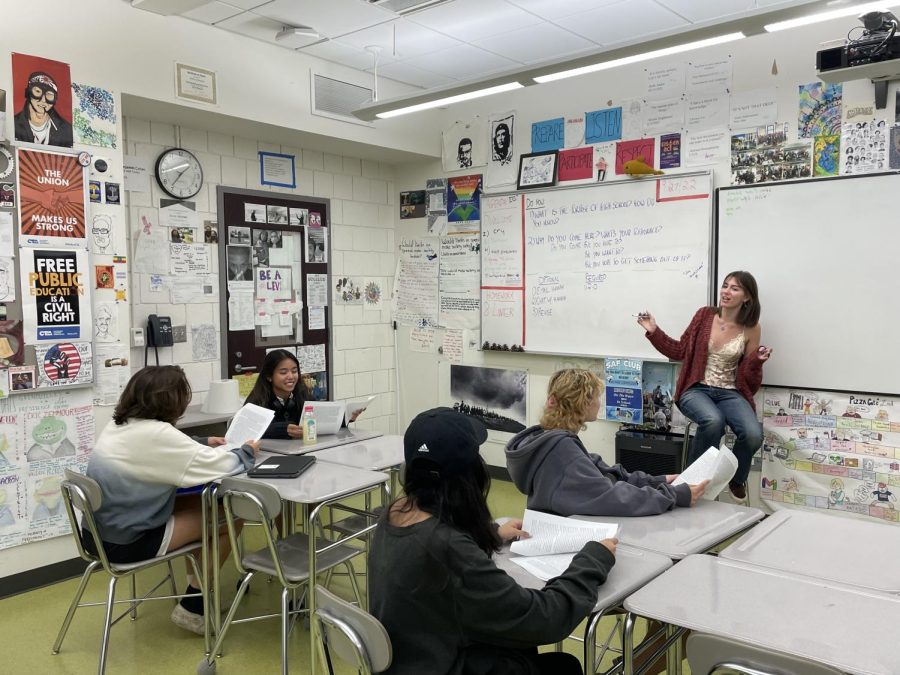Checking in on the Level Up Program
Level Up teaching assistants play crucial roles in 9th grade English and history classes.
October 6, 2022
After around 5 years of universal Honors English 9 and World History classes, many post-Level Up freshmen don’t even blink an eye at the “HN” labels on their schedules—but that doesn’t mean Level Up is any less significant. The program was created to address racially and socioeconomically segregated tracked classes at CRLS, introducing full-year alternating HN World History and English 9 classes for all freshmen. Before Level Up, the CP—standard level—classes were majority students of color and low-income students while HN classes were majority white and upper-class students—a phenomenon called ‘the achievement gap.’ Level Up was implemented to close the gap and drew many different reactions—both positive and negative. But the main questions that centered the debate about Level Up were “will it succeed?” And “what would be success?”
Last year, Level Up program TAs collected data for a teacher training event and revealed that in three different Level Up classes, a range of 93%, 85%, and 77% of students in each class were either likely or very likely to take another Honors-level class the following year. Part of the Level Up program’s goal was not only to desegregate 9th-grade English and history classes, but also to encourage increased enrollment in Honors-level classes—especially students of color—and it looks like Level Up has done that. In addition to this, many students reported that they appreciated the diversity in their Level Up classes. Caroline Berz, a 9th-grade World History teacher, echoed this sentiment, telling the Register Forum that “seeing kids who come from different neighborhoods, look different, walk in different circles, and end up becoming friends” is a success of the Level Up program.
However, back when Level Up was first implemented, some parents were concerned that the integration of CP students into HN classes would lower class quality. In contrast, former World History Level Up TA Emilia Ferreira ’24 told the Register Forum, “[In Level Up], students felt challenged in their thinking and most said they were happy to be challenged in class … I think they gained a lot from being in an environment where they were all treated as just as able to succeed in the class as everyone else was.” Data collected by the Level Up TAs found that most survey respondents praised the Level Up World History curriculum, often citing learning about interesting topics and discussions. In fact, one anonymous survey from a Level Up class reported that 63% of students thought World History “provided them with educational skills to help them succeed later on,” and 25% said the curriculum was “kind of” satisfactory. In another survey of a different Level Up class, 91% of students felt they were provided with necessary skills with 5% saying they were partially. However, responses about the English 9 curriculum told a different story: many students felt negative about the curriculum and books they had to read. In contrast, the responses in the same two surveys reported a range of 43.8% and 4.8% of students thought English 9 did not provide them with “educational skills to help them succeed later on,” with 50% and 66.7% (respectively) saying “kind of.” With these contrasting results and unclear measurements of success, it’s difficult to say whether Level Up has succeeded.
Oftentimes, the success of the program is measured by enrollment in Honors and AP courses. Dr. Benji Cohen, the Level Up program director and history teacher, told the Register Forum that he believes using AP courses as a metric is extremely problematic, as AP designation does not automatically make a class rigorous. When asked how he would measure Level Up’s success, he said, “I would look at each of my students and how they write, how they read, how they communicate and I would look at the same thing when each of them leave … I hope the rate of growth of each kid is the same, not that they all magically get on the same level, but they all improve in the same way. Eliminate APs.” Ironically, CRLS began to implement Pre-AP/AP full-year classes last year, increasing the number of AP enrollments. When asked if Level Up has achieved the goal of de-tracked classes, Dr. Cohen said, “This year, I have no co-teacher in any section while some of my colleagues have co-teachers in all of their sections. Co-teachers correspond to the make-up of the student population in a class, therefore, I think it is impossible to say we are not tracking right now in a program designed to de-track.”
Even half a decade after Level Up was implemented, the CPS community remains conflicted over the program. But proponents of the program have a hopeful outlook: Ferreira told the Register Forum, “Reflecting on the Level Up program has definitely made me think about equitable education as a whole, and how the success of the Level Up program can be extended throughout the high school experience.”
This article also appears in our September 2022 print edition.










